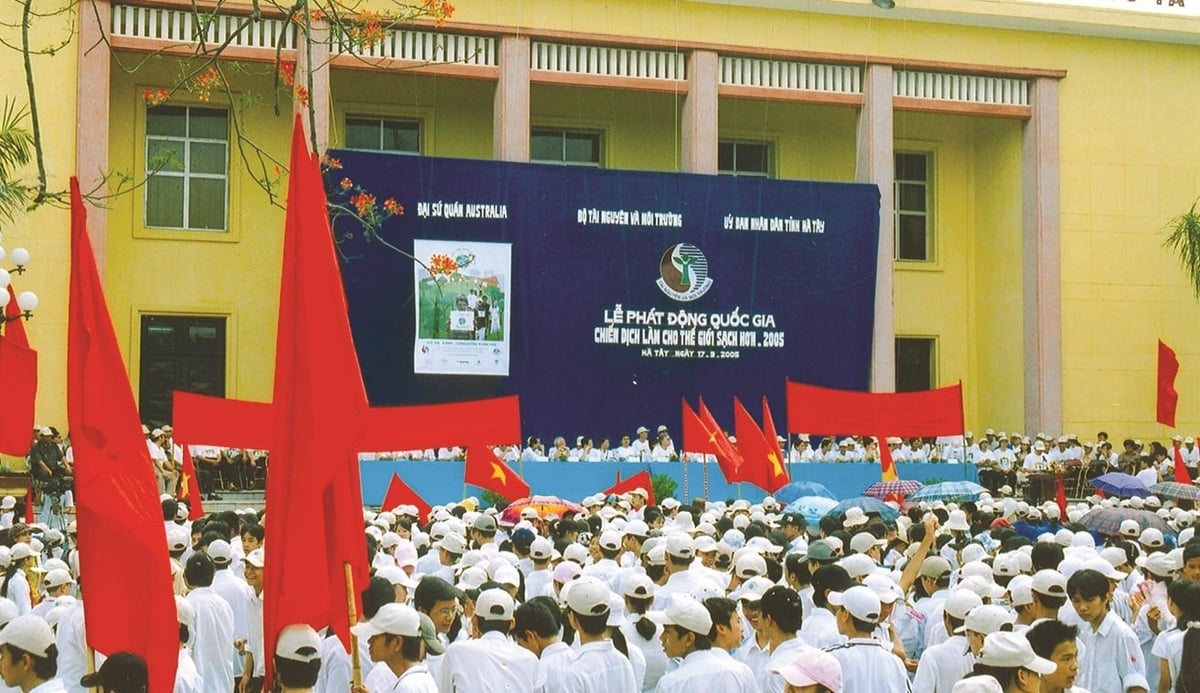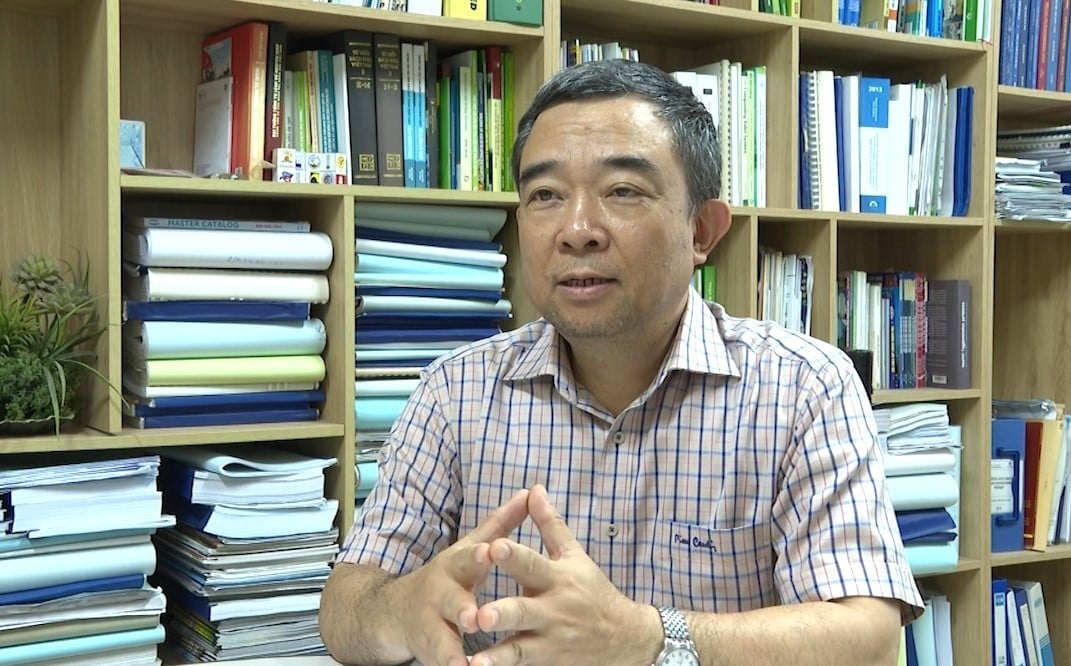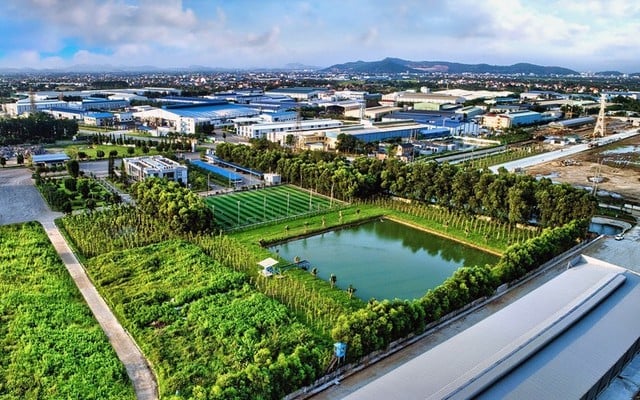November 27, 2025 | 17:16 GMT +7
November 27, 2025 | 17:16 GMT +7
Hotline: 0913.378.918
November 27, 2025 | 17:16 GMT +7
Hotline: 0913.378.918
Looking back at the history of environmental management in Vietnam, the past 40 years mark a long journey of tireless efforts by environmental officials. The journey began in 1985 when the State Committee for Science and Technology, which oversaw state management of science and technology in various fields, including natural resources and environment, submitted Resolution 246 to the Council of Ministers. This document was the government's first comprehensive and systematic policy on the environment.
Following this, the country's first international scientific conference on the environment was held in December 1991. The conference's outcome was the "National Plan for the Environment and Sustainable Development 1991-2000", which was presented to the government. This plan served as a critical foundation for the establishment of the Ministry of Science, Technology and Environment in late October 1992, which subsequently led to a series of more robust and systematic environmental protection activities.
In 1993, the National Assembly passed the country's first Environmental Protection Law, a significant milestone in establishing a legal framework for environmental protection.

Since its establishment, the Ministry of Natural Resources and Environment (formerly) has organized many activities to raise public awareness of environmental protection. Photo: Department of Environment.
In 2002, the Ministry of Natural Resources and Environment was established. This marked the beginning of a state management system for the environment that extended from the central government to local levels, significantly strengthening environmental management nationwide. To meet evolving management needs, the Environmental Protection Law was amended in 2005.
In 2010, the National Assembly enacted the Environmental Protection Tax Law. Most recently, in 2020, the revised Environmental Protection Law introduced several groundbreaking provisions, creating a crucial legal framework for Vietnam’s green transformation and the development of a green, circular, and sustainable economy.
"Vietnam has made a long and powerful stride in environmental protection. Instead of the environment trailing economic development, it is now leading the way. The choice between the economy and the environment is no longer a trade-off. The environment has truly become a central pillar of sustainable development”, said Prof. Dr. Nguyen Viet Anh of Hanoi University of Civil Engineering.

Prof. Dr. Nguyen Viet Anh - Hanoi University of Civil Engineering talks with reporters of Agriculture and Environment Newspaper. Photo: Duc Viet.
Having researched the environmental sector for many years, he noted that the environmental landscape has "completely changed" from a decade ago. The most notable achievement is the institutional and policy improvements, which are essential tools for managing the environment. This has enabled a shift from a reactive to a proactive approach, mitigating pollution that arose from a period of rapid growth, curbing the increase in pollution, and charting a new course: the path of green growth.
"Vietnam has initiated an institutional paradigm shift in agriculture and environment, from organizational structure and administration to legal frameworks, digitalization, and training. These reforms not only optimize internal efficiency but also lay a solid foundation for the country to enter an era of strong, modern, green, and deep integration", Prof. Dr. Nguyen Viet Anh stated.
According to Prof. Dr. Nguyen Viet Anh, new laws, decrees, and national target programs have improved the country's ability to manage risks, respond to environmental incidents, and adapt to climate change, all critical issues for food security and rural livelihoods. These measures have also activated a circular economy and green growth models by implementing EPR (Extended Producer Responsibility) mechanisms, improving waste management, and encouraging recycling and renewable energy. This has set the stage for a low-emission, low-pollution economy that efficiently utilizes resources. The new law and its accompanying decrees have expanded monitoring mechanisms, made environmental impact assessments more transparent, and encouraged community participation, all of which help strengthen long-term resource governance.
The impact of these measures on the economy and society is evident. The circular economy is emerging among large manufacturers, such as FDI corporations and export-oriented businesses (Nestlé, Vinamilk, Tetra Pak, Duy Tan), which have implemented packaging recovery, material recycling, product lifecycle optimization, and established domestic recycling supply chains linked to EPR.
Businesses are also shifting to "clean" and "energy-efficient" technologies. For example, companies in the cement, textile, dyeing, seafood processing, and woodworking industries are investing in circular wastewater treatment systems, biomass boilers, and heat recovery systems. Many factories are pursuing ISO:14001 certification and LEED/BREEAM ratings to meet customer orders.
Notably, there has been a boom in renewable energy and an energy transition in production, reducing reliance on coal power and meeting "green product" criteria for exports.
Furthermore, many businesses now see environmental compliance as a "passport" to enter markets in the EU, Japan, and the US. Environmental standards are no longer just a formality but have become a key competitive factor.
A new market driven by "green requirements" has emerged. The number and size of businesses in waste treatment, recycling, clean energy, and carbon consulting are growing rapidly. A carbon credit market is beginning to form, with agricultural and forestry businesses as participants.
"These signs demonstrate that Vietnam is an active member of the international community regarding green transition and emission reduction. The commitment to achieving net-zero by 2050 and the accompanying policy development are helping Vietnam maintain its credibility in international negotiations, access green financing, and expand into high-standard export markets", Prof. Dr. Nguyen Viet Anh remarked.
Stating that it is time for environmental investment to become a prerequisite for development, Prof. Dr. Nguyen Viet Anh compared it to a "one-to-four-fold" return on investment.
"According to our study with the World Bank, every USD 1 invested in environmental protection can yield a profit of USD 4 to USD 11, whereas pollution can cause damages of up to 4-5% of GDP per year. In just one year, untreated wastewater costs us 1% of GDP. Therefore, adopting green growth will change the awareness of our entire society. When businesses transform, their products can be exported, enhancing their potential and position, and ensuring they are on the right path toward sustainable development", he analyzed.
According to Prof. Dr. Nguyen Viet Anh, in the coming years, it will be necessary to continue improving institutions and policies and to make laws more relevant to daily life to mobilize all forces, from the private sector to individuals, to participate in environmental protection.

If you spend 1 USD on environmental protection, you can get from 4 USD to 11 USD in profit.
Referring to the "carrot and stick" approach, he said that if legal policies are the "stick," controlling environmental pollution by enacting strict regulations that businesses must comply with, then a "carrot" is also needed when businesses clearly understand their responsibility to control pollution at its source and recognize that environmental protection is not a matter of "coping" but is "inevitable". Green policies for businesses provide them with additional motivation to undergo green transformation. Green financing, which helps businesses access new technologies and expand markets, is essential.
He particularly emphasized the need to promote digital transformation and invest adequately in science and technology, with people at the center. "We need to invest in building a team of officials at the central and local levels in agriculture, natural resources, and environment who can adapt to new situations and tasks. The new two-tiered local government model, which has been officially implemented, will provide a foundation for effective and transparent agricultural-environmental institutional reform, promoting green production and climate change adaptation", Prof. Dr. Nguyen Viet Anh concluded.
Translated by Linh Linh

(VAN) After the institutional merger, Da Nang possesses significant forest-carbon reserves and is proactively engaging in the carbon market, creating a new revenue stream.

(VAN) An Giang strengthens communication against IUU fishing, increases inspections and sanctions, and is determined to remove the EC’s “yellow card” while developing a sustainable fisheries sector.

(VAN) As green transition becomes a global trajectory, Viet Nam’s biggest challenge is not only technology and models, but how to ensure that capital flows reach the right beneficiaries.

(VAN) The Ministry of Agriculture and Environment must spearhead the construction of green governance, spanning decision-making processes and investment standards to policy evaluation mechanisms.

(VAN) The Agriculture and Environment sector of Khanh Hoa has achieved numerous milestones over the past 80 years, contributing significantly to the goal of establishing the province as a centrally governed city by 2030.

(VAN) Viet Nam is entering the pivotal period of 2025-2030, moving toward the formulation of the Remote Sensing Law, which will establish a legal foundation for the development of national digital data.

(VAN) The agricultural sector is finalizing the strategic framework for emission reduction, setting the goal of sharply cutting methane and 403.7 million tons of CO2 equivalent and moving toward Net Zero by 2050.